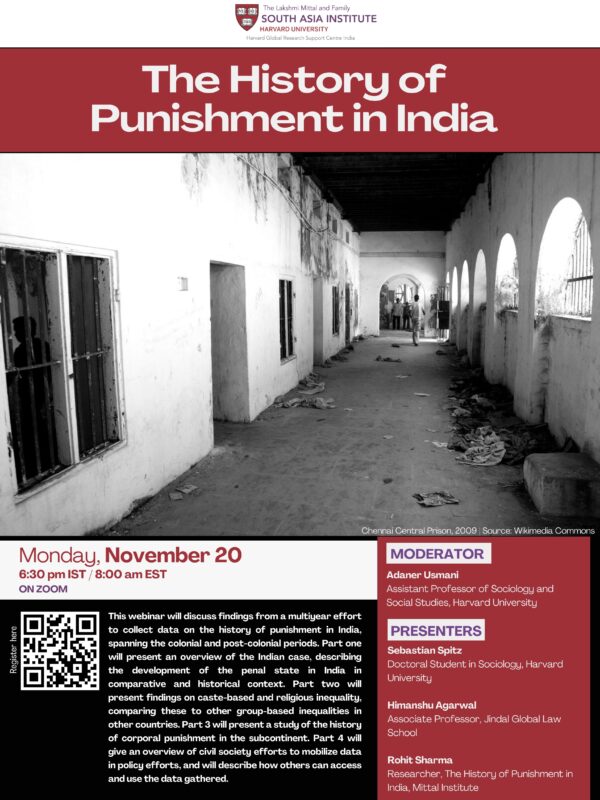The Mittal Institute invites you to a webinar on the ‘History of Punishment in India’ on November 20th at 8:00am EST / 6:30pm IST. Register below to join!
This webinar will discuss findings from four years of archival research into the history of punishment in India, spanning the colonial and post-colonial periods. This research effort is part of a broader effort to gather data on the history of punishment around the world. The webinar will consist of four short presentations. One presentation will present an overview of the Indian case, describing the development of the penal state in India in a comparative and historical context. A second presentation will present findings on caste-based and religious inequality, comparing these to other group-based inequalities in other countries around the world. A third presentation will present a study of the history of corporal punishment on the subcontinent. And the final, fourth presentation, will give an overview of civil society efforts to mobilize data in policy efforts, and will describe how others can access and use the data we have gathered.
Moderator:
Adaner Usmani is Assistant Professor of Sociology and Social Studies at Harvard University. His research is driven by two questions: Why do some people flourish while others suffer? And, what explains why, in some places but not others, movements or policies emerge to challenge or moderate this inequality? In one project, he explores when and why ordinary individuals manage to coordinate collective action, and how well these patterns explain the forward march of democracy and the extent of economic redistribution. In a different project, he studies the origins and consequences of American mass incarceration. Most of his work uses computational and quantitative methods, but he retains a keen interest in the comparative historical method, and in qualitative social science more generally.
Presenters:
Sebastian Spitz is a PhD Student in the Harvard University Sociology Department, and has a JD from Harvard Law School. Sebastian’s research focuses on racial and gender inequality in the criminal justice system, in the United States and abroad.
Himanshu Agarwal is an Associate Professor at the Jindal Global Law School. He has obtained an LL.M. from SOAS, University of London as a Chevening scholar, and an LL.M. from Harvard Law School. He teaches legal methods and criminal psychology and his research interests lie in criminal legal histories and psychology and law.
Rohit Sharma is a researcher at the “The History of Punishment in India” at Lakshmi Mittal & Family South Asia Institute at Harvard University. Currently, he is also co-conceptualising a knowledge hub with a Delhi-based Not for Profit, Project Second Chance which aims to bridge the knowledge and practical gap between a) academia and b) ex-prisoners /undertrial prisoners on prisons and prisoners-based issues.

